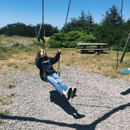Image credit: Columbia Spectator
The spring semester here at Barnard has been peppered with special visits from illustrious alumnae, from Martha Stewart’s event in January to the return of hundreds of graduates for President Beilock’s inauguration in February. On Monday, March 27, the Athena Pre-Law Society kept the momentum going by hosting a talk with Susan Herman, a member of the Class of 1968 and the current president of the American Civil Liberties Union. Moderated by APLS student Madison Ailts, in the Diana Event Oval, Herman’s talk touched on everything from her responsibilities at the ACLU to the organization’s stance on some of today’s most hot-button issues.
Perhaps not surprisingly, both moderator and audience questions alike kept the conversation circling largely around gun control. Herman called the youth activism that emerged after 17 people were killed at Marjory Stoneman Douglas High School in Florida “amazing,” but was quick to uphold that ACLU is by nature a non-partisan organization that focuses their energies “on policies, what [lawmakers] do, not what they say.” “The ACLU believes in reasonable gun control,” Herman said, while admitting that gun control advocates like to criticize the ACLU for its apparent lack of action on the issue. When pressed on more specific details about the ACLU’s approach to gun reform, Herman said, “[The ACLU] cannot define what gun control is, legislation has to do that.” She did add, however, that the organization is generally opposed to categorical gun reforms, such as those that entail banning the possession of firearms for individuals on the terrorist watch-list or with a history of mental illness. “That’s where we start demonizing people,” Herman explained.
Aside from gun control, Herman also addressed an issue occupying many minds across Barnard and Columbia’s campus: the right to dissent on college campuses. When asked about how students should react when, as this community saw last fall, staunchly conservative personalities are invited to speak on campus, Herman suggested “surrounding” the guest with education. “What can you do to persuade someone not to listen to a white supremacist? You can boycott, you can hold an alternative event at the same time, you can have a silent vigil, there’s a lot you can do.” Herman said. Regardless of what route students choose, she added, it is important to remember that “Not everyone agrees—there are going to be people who say things you do not like.”
As the conversation wound down with a student Q&A, Herman highlighted other major goals, such as expanding People Power, the ACLU’s campaign to educate people across the country on creating change in their local communities. By this point, however, the crowd in the Event Oval had thinned out; in fact, the space was never packed to begin with. Given Herman’s status as not only an accomplished Barnard alumnae, but also her position at the forefront of issues that matter to students on campus, the amount of empty seats at the event raises a handful of questions about how alumnae are valued by current students. It’s true that Herman’s experience at Barnard was world’s away from that of today’s students—as she mentioned on Monday, Herman entered Barnard already married and spent most of her time off-campus with her husband. But, in spite of the difference between Herman’s Barnard life and the one that exists five decades later, surely her advice on everything from professional development to gender discrimination contains more than a few nuggets of wisdom for today’s students. Packed room or not, however, Susan Herman’s return to Barnard was made for a wonderful event, the success of which will hopefully convince those not in the crowd to stop by next time.

